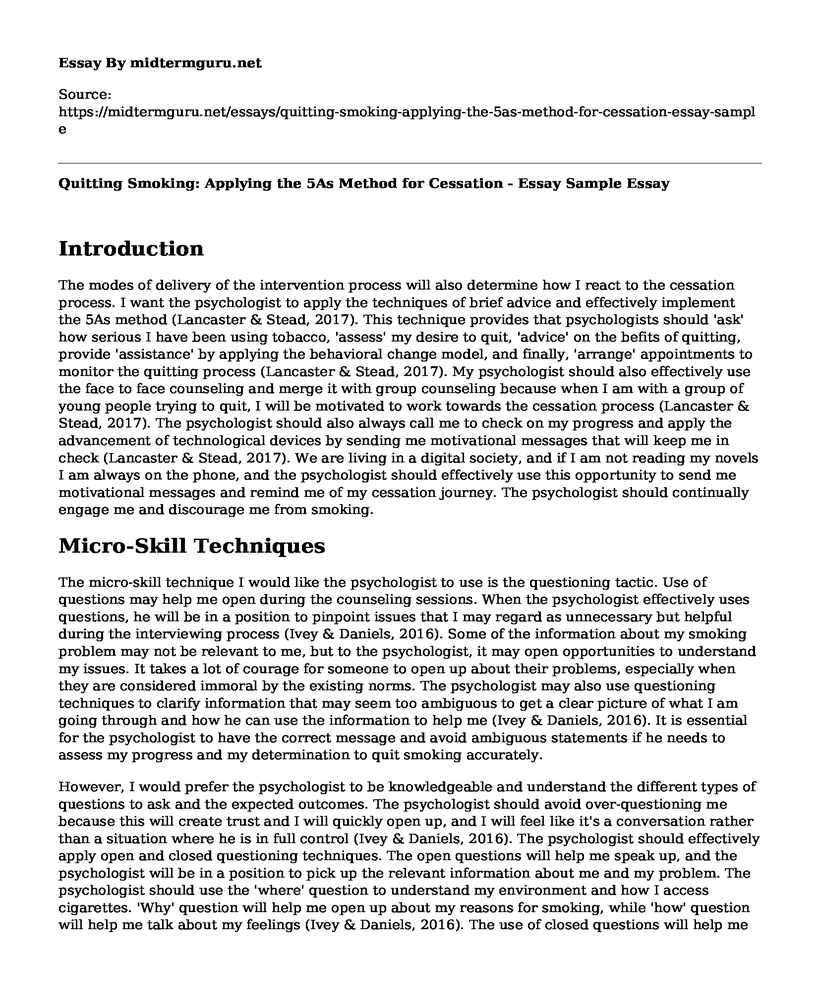Introduction
The modes of delivery of the intervention process will also determine how I react to the cessation process. I want the psychologist to apply the techniques of brief advice and effectively implement the 5As method (Lancaster & Stead, 2017). This technique provides that psychologists should 'ask' how serious I have been using tobacco, 'assess' my desire to quit, 'advice' on the befits of quitting, provide 'assistance' by applying the behavioral change model, and finally, 'arrange' appointments to monitor the quitting process (Lancaster & Stead, 2017). My psychologist should also effectively use the face to face counseling and merge it with group counseling because when I am with a group of young people trying to quit, I will be motivated to work towards the cessation process (Lancaster & Stead, 2017). The psychologist should also always call me to check on my progress and apply the advancement of technological devices by sending me motivational messages that will keep me in check (Lancaster & Stead, 2017). We are living in a digital society, and if I am not reading my novels I am always on the phone, and the psychologist should effectively use this opportunity to send me motivational messages and remind me of my cessation journey. The psychologist should continually engage me and discourage me from smoking.
Micro-Skill Techniques
The micro-skill technique I would like the psychologist to use is the questioning tactic. Use of questions may help me open during the counseling sessions. When the psychologist effectively uses questions, he will be in a position to pinpoint issues that I may regard as unnecessary but helpful during the interviewing process (Ivey & Daniels, 2016). Some of the information about my smoking problem may not be relevant to me, but to the psychologist, it may open opportunities to understand my issues. It takes a lot of courage for someone to open up about their problems, especially when they are considered immoral by the existing norms. The psychologist may also use questioning techniques to clarify information that may seem too ambiguous to get a clear picture of what I am going through and how he can use the information to help me (Ivey & Daniels, 2016). It is essential for the psychologist to have the correct message and avoid ambiguous statements if he needs to assess my progress and my determination to quit smoking accurately.
However, I would prefer the psychologist to be knowledgeable and understand the different types of questions to ask and the expected outcomes. The psychologist should avoid over-questioning me because this will create trust and I will quickly open up, and I will feel like it's a conversation rather than a situation where he is in full control (Ivey & Daniels, 2016). The psychologist should effectively apply open and closed questioning techniques. The open questions will help me speak up, and the psychologist will be in a position to pick up the relevant information about me and my problem. The psychologist should use the 'where' question to understand my environment and how I access cigarettes. 'Why' question will help me open up about my reasons for smoking, while 'how' question will help me talk about my feelings (Ivey & Daniels, 2016). The use of closed questions will help me provide a Yes or No answer to specific questions (Ivey & Daniels, 2016). In as much as the psychologist is in a position to use questioning as a tactic to get information from me, he should refrain from asking questions that will infringe on my rights, or make me feel uncomfortable (Ivey & Daniels, 2016). The psychologist should also have a good background of my cultural diversity to avoid questions that may create conflicts and hatred.
Conclusion
In conclusion, smoking cessation presents one of the problems affecting the health of the American population, and despite the several measures in place to help smokers quit, it is still one of the leading causes of preventable deaths. Since smoking is a behavior learned from lifestyles, behavioral intervention model should be the appropriate model to help the cessation process for the smokers who are determined to quit smoking. In this case, I would prefer the psychologist to be well equipped with vast knowledge and behavioral techniques to help me through the journey of quitting. The psychologist should be in a position to effectively apply the best delivery measures and micro-skill to help me through the journey. The psychologist should be in a position to understand me without being judgmental and create a comfortable environment by building and earning my trust so that I can open up without fear.
References
Ivey, A. E., & Daniels, T. (2016). Systematic interviewing microskills and neuroscience: Developing bridges between the fields of communication and counseling psychology. International Journal of Listening, 30(3), 99-119.
Lancaster, T., & Stead, L. F. (2017). Individual behavioural counselling for smoking cessation. Cochrane database of systematic reviews, (3).
Prochaska, J. O., Redding, C. A., & Evers, K. E. (2015). The transtheoretical model and stages of change. Health behavior: Theory, research, and practice, 125-148.
Renuka, P., & Pushpanjali, K. (2014). Effectiveness of health belief model in motivating for tobacco cessation and to improving knowledge, attitude and behavior of tobacco users. Cancer and Oncology Research, 2(4), 43-50.
Cite this page
Quitting Smoking: Applying the 5As Method for Cessation - Essay Sample. (2022, Dec 27). Retrieved from https://midtermguru.com/essays/quitting-smoking-applying-the-5as-method-for-cessation-essay-sample
If you are the original author of this essay and no longer wish to have it published on the midtermguru.com website, please click below to request its removal:
- Project of Improving Nurses Practice Paper Example
- Annotated Bibliography on Road Safety Measures - Paper Example
- Presentation Outline on Chocolate: Pros and Cons
- Paper Example on Internet and Digital Technologies' Effects on Mental Health
- How The Disease Shaped World History - Essay Sample
- Exploring Effects of Cyberbullying on College Students - Research Paper
- Personality: Unique Thinking, Actions & Feelings - Essay Sample







